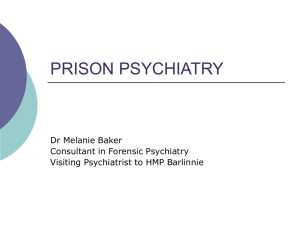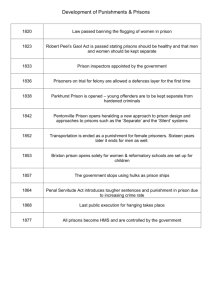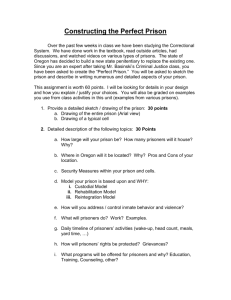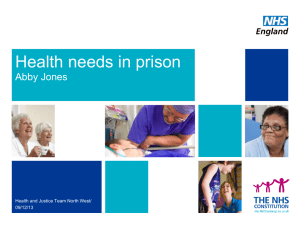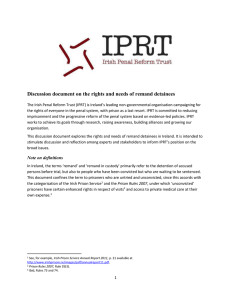Good practice guide charging for prisoners
advertisement
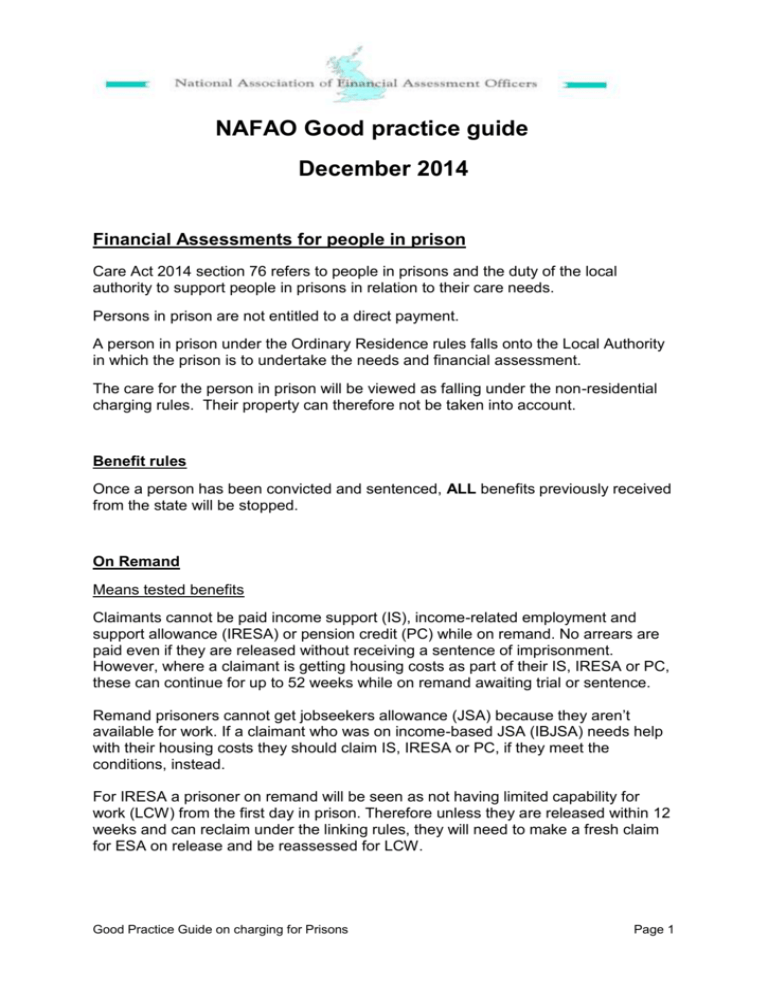
NAFAO Good practice guide December 2014 Financial Assessments for people in prison Care Act 2014 section 76 refers to people in prisons and the duty of the local authority to support people in prisons in relation to their care needs. Persons in prison are not entitled to a direct payment. A person in prison under the Ordinary Residence rules falls onto the Local Authority in which the prison is to undertake the needs and financial assessment. The care for the person in prison will be viewed as falling under the non-residential charging rules. Their property can therefore not be taken into account. Benefit rules Once a person has been convicted and sentenced, ALL benefits previously received from the state will be stopped. On Remand Means tested benefits Claimants cannot be paid income support (IS), income-related employment and support allowance (IRESA) or pension credit (PC) while on remand. No arrears are paid even if they are released without receiving a sentence of imprisonment. However, where a claimant is getting housing costs as part of their IS, IRESA or PC, these can continue for up to 52 weeks while on remand awaiting trial or sentence. Remand prisoners cannot get jobseekers allowance (JSA) because they aren’t available for work. If a claimant who was on income-based JSA (IBJSA) needs help with their housing costs they should claim IS, IRESA or PC, if they meet the conditions, instead. For IRESA a prisoner on remand will be seen as not having limited capability for work (LCW) from the first day in prison. Therefore unless they are released within 12 weeks and can reclaim under the linking rules, they will need to make a fresh claim for ESA on release and be reassessed for LCW. Good Practice Guide on charging for Prisons Page 1 A single prisoner awaiting trial or sentence can get universal credit (UC) for up to six months, if she/he previously received the benefit, but only the housing cost element is paid. If there was a joint claim immediately before one of the couple went into prison the other member must make a claim for UC as a single person. However both partners’ income and capital still count for UC. If a dependent child is a prisoner they are no longer part of the UC claim. Non means- tested benefits Payments of incapacity benefit (IB), contributory employment and support allowance (CESA), severe disablement allowance (SDA), attendance allowance (AA), disability earnings allowance (REA), retirement allowance (RA) and carer’s allowance are suspended on remand. Payment of personal independence payment (PIP) stops after 28 days in prison. In Custody Custody is where a person has been tried, convicted and sentenced to a custodial sentence. Means-tested benefits Prisoners are not entitled (in their own right or as part of someone else’s claim) to JSA, ESA, IS or PC. A fresh claim will have to be made on release. However, someone who is temporarily detained in police custody for a maximum of 96 hours will continue to get JSA as they will still be treated as available for work. For IRESA a prisoner will be seen as not having limited capability for work from the first day in custody. Therefore unless they can reclaim on release under the linking rules (12 weeks) they will need to make a fresh claim for ESA on release and be reassessed for LCW. Housing costs, such as mortgage interest, won’t be paid as the prisoner in custody is no longer entitled to a qualifying benefit. However, the person left in the home may be able to claim even if they are not legally liable for the costs Claimants serving a custodial sentence are not regarded as being in remunerative work for WTC purposes (whether they are working either inside or outside a prison) A single claimant who is a prisoner can get universal credit (UC) housing costs for up to six months if they were receiving UC before they went to prison but only if they have not been sentenced to a term that is expected to go beyond six months. Good Practice Guide on charging for Prisons Page 2 Non means-tested benefits While serving a custodial sentence, claimants are disqualified from IB, ESA(C), SDA, AA, DLA, CA, SRP, MA, and bereavement benefits, REA or RA. No-one else can receive an increase in any of these benefits for the claimant while they are in prison. If the sentence is later quashed the claimant will be treated as not having received a custodial sentence and benefits for the time spent in prison will be reimbursed. ESA is suspended from the first day of custody. If the sentence is for more than six weeks the prisoner will be found not to have limited capability for work Payment of personal independence payment (PIP) stops after 28 days in prison. Different periods spent as a prisoner separated by one year or less are linked together and treated as one period. Hospital Most prisoners in hospital will generally be treated as prisoners and therefore do not qualify for benefits. There are special rules for prisoners detained under Section 45A or 47 of the Mental Health Act (MHA) 1983. They are treated as prisoners for benefit purposes but only until the date they would have been entitled to be released under the original sentence or, if serving an indeterminate sentence, until their release is authorised. After that, if they are still in hospital, their benefit might be affected by the rules that apply to hospital in-patients. People convicted of a criminal offence, which are not given a prison sentence, but are ordered to be detained in hospital under Section 37 of the MHA instead, may qualify for benefits but could be affected by the hospital benefit rules. People detained for treatment under Section 36 of the MHA having been held on remand, can be eligible for means-tested benefits. However non income-related benefits are suspended pending the final outcome of trial proceedings. Financial Assessment The local authority has the ability to not charge for these services, however, if you currently charge for non-residential services and will continue to do so after April 2015, you would need to undertake a consultation on the decision to exempt certain categories of individuals, i.e. prisoners. It may be necessary to consult with the whole population in your authority. You should seek legal advice from your internal legal department on this. If you decide to charge it is unlikely that you will be looking to send your financial assessment staff into the prison. The CRB check used by most local authorities to Good Practice Guide on charging for Prisons Page 3 determine someone’s ability to visit with vulnerable people is not used for prisons. This is a totally different type of security check and will take potentially in excess of 3-4 months. It is therefore good practice to use the staff that will be undertaking the care needs assessment to ask several pertinent questions to establish the viability of applying a charge to an individual. 1. 2. 3. 4. Check are they an existing service user Benefit checks Do they have over £23250 Are they in receipt of a private income, i.e. occupational pensions, investment income etc? 5. Can they obtain copies of bank statements? (They will have to write for these as they are not entitled to internet banking, therefore there will be a delay). 6. Does someone else deal with your finances, e.g. partner at home that you could meet with? 7. Get the individual to complete a direct debit form. Following this discussion it is advisable to get them to sign a declaration in line with other individuals provided with a service. (example is attached). Good Practice Guide on charging for Prisons Page 4 Declaration by Service User 1) I certify that the information I have given is, to the best of my knowledge, a full and true statement of my income, expenses and capital assets. I understand that I may be asked to provide evidence of my income, expenses and capital assets, to local authority name. 2) I will notify Local authority name of changes in my expenses or income. 3) I understand that if I do not fully complete the assessment or provide information requested, I will be liable to pay full charges/costs for services. 4) I accept that if assessed as liable to pay I must make regular and prompt payments to local authority name or my landlord/support provider for the service I receive. 5) I understand that should my payments fall into arrears, local authority name will take action against me, or any person appointed to deal with my finances, to recover any outstanding sums. 6) I agree that other agencies may be contacted to verify any details supplied in this assessment: this includes contacting my local council housing benefit section in order to verify the social security benefits I receive. I understand that the information received will be used to assess my contribution. I agree that the local council may pass details of my rate of benefit and, where necessary, the components of that rate, to local authority name for the purposes of assessing my contribution to the cost of my services only, on a continuing basis. I understand that I may withdraw my consent to the supply of information regarding my benefit entitlement at any time by notifying, in writing, the appropriate office. Signature: Date: (Service user or their legal representative) Signature: Date: (Partner, if benefits are claimed jointly) Good Practice Guide on charging for Prisons Page 5 FULL COST Declaration I have more than £23,250 in capital/I do not wish to disclose my financial circumstances*. The standard costs in 2014/15 are: £XXXX an hour for home care I will notify you if my capital drops below £23,250 as I might be entitled to help with the cost of the services I receive. I accept that I must make regular and prompt payments to local authority name for the service(s) I receive. I understand that should my payments fall into arrears, local authority name may wish to take action to recover any outstanding sums. Signature………………………………PRINT NAME …………………………… (Service User/ or his /her legal representative, e.g. attorney, appointee, receiver) *delete as applicable Date………………………………………….. Invoicee’s name: ……………………………………………………………… Invoicee’s Address: ………………………………………………………… …..……………………………………………………………………………. ….…………………………………………………………………………….. Postcode ………………………………………………………………….. Good Practice Guide on charging for Prisons Page 6
